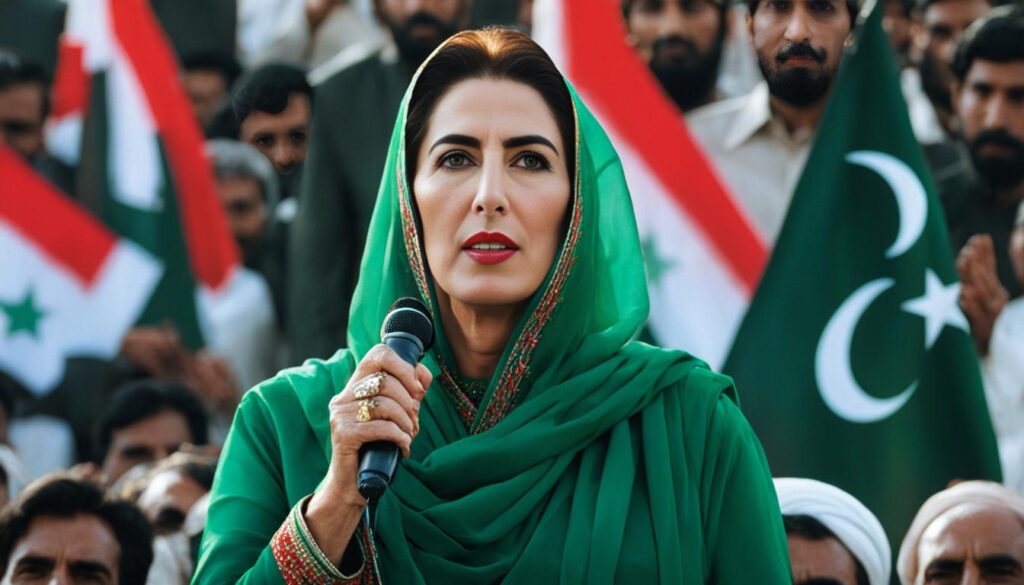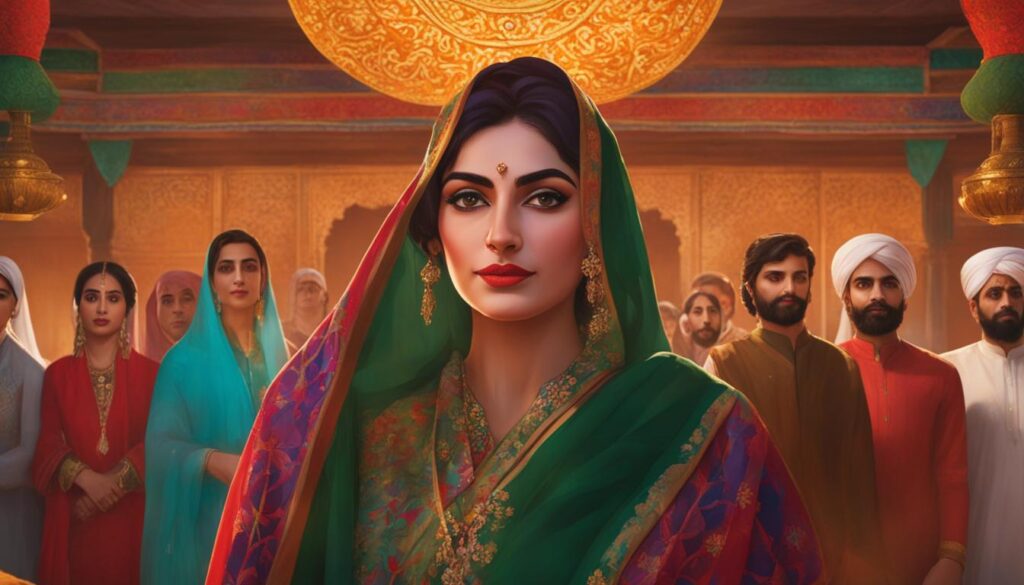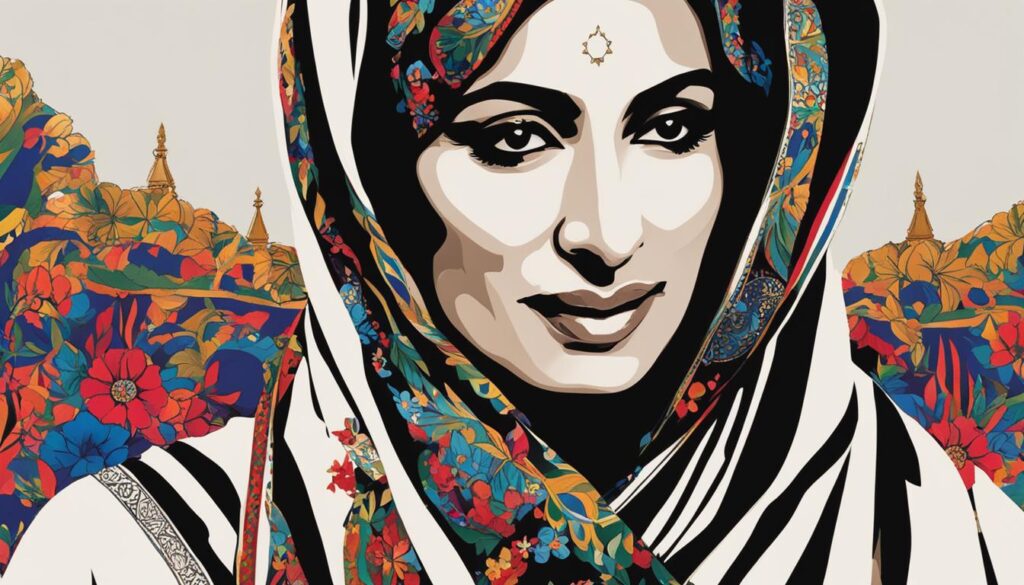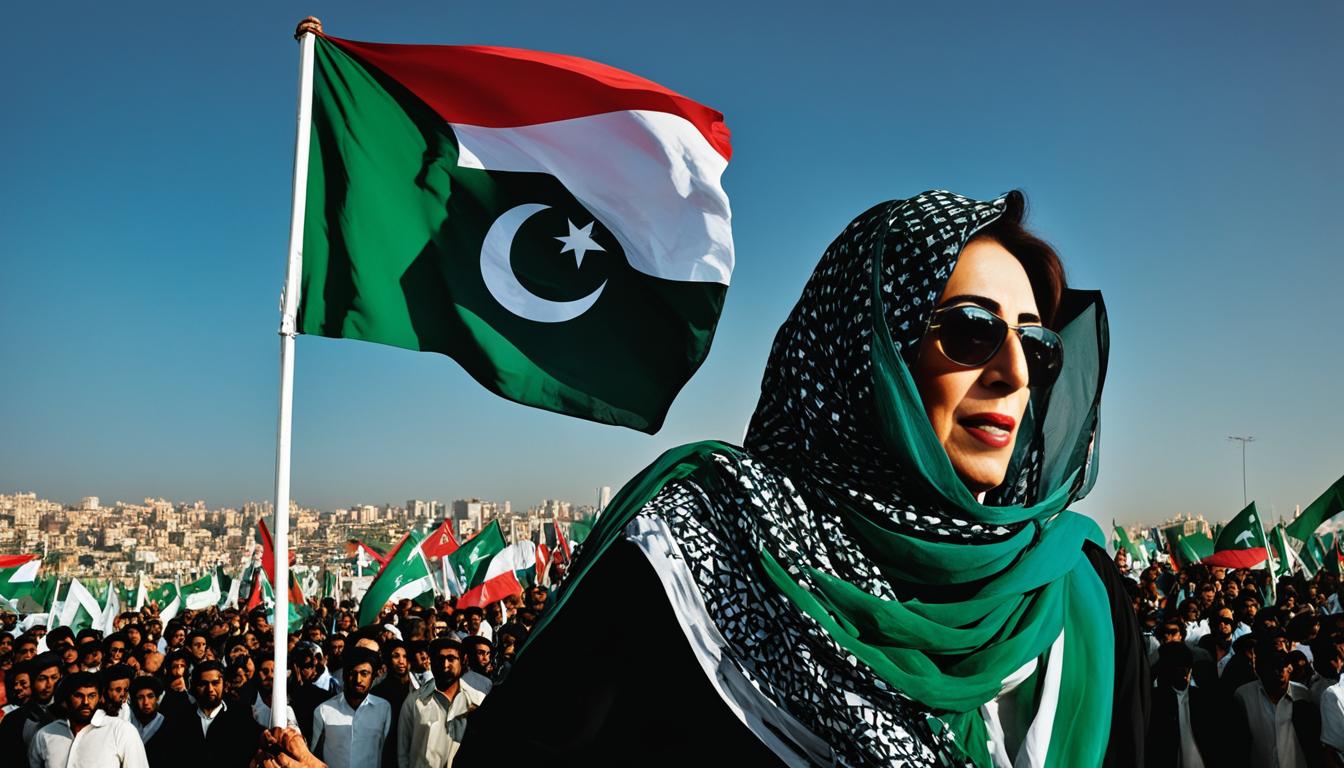Benazir Bhutto was a leader that revolutionized Pakistani politics, serving as the country’s first female Prime Minister. Following in her father’s footsteps, Zulfikar Ali Bhutto, a prominent politician in the country’s history, Bhutto carved out her own place in Pakistani politics and made a name for herself on the world stage. Her impact on Pakistan’s political landscape is still being felt today, years after her tragic assassination in 2007.
Pakistan has a long history of political turmoil and instability, and it’s in this context that Bhutto stepped onto the stage. Her leadership has had a lasting impact on the country, and her contributions are still felt today in both politics and society at large.
Key Takeaways
- Benazir Bhutto is a prominent figure in Pakistani politics, and has been an inspiration to many women in the country.
- Her contributions to the political landscape of Pakistan are still being felt today, and her legacy continues to shape the country’s future.
- Bhutto was a strong advocate for social causes, particularly in advancing women’s rights in Pakistan.
- She worked hard to establish herself as a leader in a heavily male-dominated political system, paving the way for future generations of women in politics.
- Bhutto’s tragic assassination in 2007 cut short a promising political career, leaving behind a legacy that is still revered in Pakistan and beyond.
Early Life and Education
Benazir Bhutto was born in Karachi, Pakistan, on June 21, 1953, into a prominent political family. Her father, Zulfikar Ali Bhutto, went on to become Prime Minister of Pakistan, and her mother, Begum Nusrat Bhutto, served as minister for information and broadcasting.
From a young age, Benazir was exposed to a political environment and was actively involved in her father’s campaigns. She received her primary education at the Catholic Presentation Convent School in Karachi and later attended the Karachi Grammar School.
In 1969, Benazir left Pakistan to study at Radcliffe College in the United States, where she obtained a Bachelor of Arts degree in Comparative Government in 1973. She continued her education at the University of Oxford, where she completed a course in International Law and Diplomacy.
“I come from a family that believes in public service, and my father set an example for me. But growing up, it was in the broader context of understanding that our family was never separate from the country…”
Political Beginnings
Benazir Bhutto’s entry into politics was influenced by her family’s legacy of political activism. Her father, Zulfikar Ali Bhutto, was a prominent politician and the founder of the Pakistan People’s Party (PPP). Following her education at Harvard and Oxford universities, Benazir returned to Pakistan and became involved in her father’s political party, working as an advisor to him.
After her father was overthrown in a military coup in 1977, Benazir’s political career began in earnest. She was placed under house arrest for her activism, during which time she wrote “The Daughter of the East,” a memoir that detailed her father’s political career and her own entry into politics.
In 1982, the military regime agreed to release Benazir from house arrest and she left Pakistan to lobby for her father’s release and re-establish the PPP on an international level. Following her father’s execution in 1979, Benazir became the leader of the PPP and returned to Pakistan to campaign for democratic restoration.

“I’m not afraid of death because I don’t believe in it. It’s just getting out of one car, and into another.”
First Term as Prime Minister
After winning the 1988 general elections, Benazir Bhutto became the first woman to serve as the Prime Minister of Pakistan. Her inaugural speech was focused on improving the political, economic, and social conditions of the country.
One of her biggest achievements during her first term was the restoration of democracy in Pakistan after years of military rule. She also implemented numerous policies to improve the lives of ordinary citizens, including land reforms and measures to promote education and healthcare.
However, her term was not without challenges. Bhutto faced opposition from many quarters, including from within her own party. Her government was dismissed in 1990 on charges of corruption, but she was re-elected as Prime Minister in 1993.
Overall, Benazir Bhutto’s first term as Prime Minister marked a significant milestone in Pakistan’s history, paving the way for greater representation of women and further strengthening of democratic institutions.
Exile and Return
After serving as Pakistan’s Prime Minister, Benazir Bhutto was once again exiled from her country in 1998 following corruption charges against her and her husband. She spent her years abroad, continuing her activism for democracy and women’s rights. During these years, Bhutto met with world leaders and addressed international forums, garnering support for her cause.
Despite concerns for her safety, Bhutto made the decision to return to Pakistan in October 2007 to campaign for the upcoming elections and challenge the military rule. Upon her arrival, a suicide bomber attacked her convoy, but Bhutto survived with injuries. She continued her campaign until her assassination during a political rally in December 2007.
The Controversial Deal
During her time abroad, Benazir Bhutto negotiated a deal with Pervez Musharraf, who was then the President of Pakistan. The agreement allowed Bhutto to return to Pakistan and granted amnesty for her past corruption charges, in exchange for her party’s support for Musharraf’s re-election as president.
The deal was widely criticized by Bhutto’s supporters and opposition parties, who saw it as a betrayal of her anti-corruption stance. Despite this, Bhutto defended her decision, stating that it was the only way to ensure fair and free elections in Pakistan.
Second Term as Prime Minister
Benazir Bhutto’s first term as the Prime Minister was marked by numerous achievements, and she was re-elected to the position in 1993. During her second term as Prime Minister, Bhutto aimed to continue her focus on economic progress and democratic governance.
One of the key policies implemented during her second term was the initiation of the ‘1994 Industrial Policy’, which focused on the development of small and medium-sized enterprises. This policy aimed to boost economic growth by increasing exports and generating employment opportunities. Bhutto also focused on women’s rights, with a specific emphasis on gender-based violence, and introduced the ‘Protection of Women Act’.
Bhutto was known for her stance on nuclear power and continued a positive relationship with China, initiating several developmental projects with them. She also strengthened Pakistan’s ties with the United States, primarily through her efforts to fight terrorism in the region.
However, despite her positive contributions during her second term as Prime Minister, the period was also marked by controversies, including allegations of corruption. Bhutto’s government was dismissed in 1996 following accusations of corruption and mismanagement, but she continued to be a prominent figure in Pakistani politics.

Bhutto’s Contributions during the Second Term
| Policy | Description |
|---|---|
| 1994 Industrial Policy | Initiated to promote the development of small and medium enterprises to increase export and employment opportunities. |
| Protection of Women Act | Introduced to focus on gender-based violence and women’s rights. |
| Nuclear Power | Bhutto continued to promote the country’s nuclear power status. |
| International Relations | She strengthened relationships with the United States and China. |
“My primary objective is to revive the economy and to improve the standard of living of our people. We will ensure that democratic governance is not only restored but sustained.”
Benazir Bhutto’s second term as Prime Minister was marked by a focus on economic development, women’s rights, and international relationships. Despite accusations of corruption, Bhutto’s contributions towards Pakistan’s development have been widely acknowledged and continue to shape the country’s political landscape.
Opposition and Assassination
Despite her efforts in improving Pakistan’s political and social landscapes, Benazir Bhutto faced significant opposition and challenges throughout her career.
One of her most prominent adversaries was General Zia-ul-Haq, who overthrew the democratic government in a military coup and imposed martial law in 1977. The Bhutto family was arrested, and Benazir was kept in solitary confinement for more than a year on charges of corruption and conspiracy against the state.
Years later, in 2007, Benazir Bhutto returned to Pakistan from self-imposed exile to participate in the general elections and continue her political career. However, tragedy struck on December 27th, when she was assassinated during a rally in Rawalpindi.
Her assassination sent shockwaves across the world and sparked violent protests in Pakistan. There were allegations of a conspiracy involving the military and intelligence agencies, with many demanding justice for Bhutto’s murder.
Her untimely death was a significant blow to Pakistan’s democratic process and the fight for human rights, and her legacy continues to inspire many to this day.
Legacy in Pakistani Politics
Benazir Bhutto’s legacy in Pakistani politics is undeniable and far-reaching. Her contributions not only transformed the political landscape of Pakistan but also inspired future leaders in the country.
As the first woman to hold the position of Prime Minister in an Islamic country, Benazir Bhutto paved the way for women’s inclusion and empowerment in Pakistani politics. Her struggle against injustice and oppression gave voice to the marginalized sections of the society, and her policies on education, healthcare, and human rights represented her unwavering commitment to social progress.
Despite enduring political challenges and suffering exile, Benazir Bhutto remained a prominent figure in Pakistani politics until her untimely death. Her assassination in December 2007 shocked the country and sparked widespread protests. However, she remains a revered figure in Pakistani politics and continues to inspire individuals to strive for positive change.
Benazir Bhutto’s Accomplishments
| Accomplishments | Description |
|---|---|
| Held the position of Prime Minister | The first woman to become the Prime Minister of Pakistan, serving two non-consecutive terms. |
| Promoted education and healthcare | Launched several initiatives to improve the education and healthcare sectors in Pakistan. |
| Advanced women’s rights | Advocated for gender equality and the empowerment of women in Pakistani society. |
| Opposed extremism and radicalism | Stood against religious extremism and militant groups, calling for a moderate and democratic Pakistan. |
Benazir Bhutto’s legacy in Pakistani politics highlights the importance of principled leadership, social progress, and gender equality. Her contributions have left a lasting impact on both Pakistani politics and the world stage, inspiring future generations to pursue positive change.

Social and Women’s Rights Activism
Benazir Bhutto was a fierce advocate for social activism and women’s rights throughout her life and political career. As the first female Prime Minister in a Muslim country, Bhutto worked tirelessly to advance the rights of women in Pakistan and around the world.
During her time as the Prime Minister, she established the National Commission on the Status of Women to investigate issues related to gender inequality and discrimination. She also implemented policies aimed at improving women’s access to education and healthcare, as well as increasing their representation in government and public life.

Bhutto was a vocal advocate for the rights of women in Pakistan and regularly spoke out against patriarchal systems that restricted their freedom and opportunities. She championed the cause of gender equality on the global stage, speaking at conferences and forums around the world to raise awareness and promote change.
“Women are active in every sphere of life, yet they remain invisible.”
Bhutto’s efforts in advancing women’s rights have inspired many activists and leaders around the world, earning her international recognition and acclaim.
Women in Pakistan: The Struggle Continues
Despite the progress made in advancing women’s rights in Pakistan, many challenges remain. Women continue to face inequality and discrimination in various forms, including limited access to education and healthcare, violence, and restrictive social norms.
Bhutto’s legacy in the fight for gender equality serves as a reminder of the work that still needs to be done to create a fair and just society for all. Her advocacy and activism continue to inspire women and advocates around the world to work towards a future where gender equality is a reality.
International Recognition and Influence
Benazir Bhutto’s impact on the international political stage cannot be overstated. As the first female Prime Minister of Pakistan, she broke down barriers and inspired women around the world to enter into the political realm.
Her leadership and dedication to democracy earned her many accolades and awards, including the UNESCO Madanjeet Singh Prize for the Promotion of Tolerance and Non-Violence in 2002 and the International Democracy Award in 2005.
Bhutto’s global influence extended beyond awards and recognition into her active involvement with international organizations. She served as the Chairperson of the South Asian Association for Regional Cooperation and as a member of the United Nations Commission on Human Rights.
Despite her untimely assassination, Benazir Bhutto’s legacy lives on and continues to inspire leaders around the world. Her dedication to democratic values and women’s rights serve as a powerful reminder of the important role individuals can play in shaping the world we live in today.
Continuing Relevance and Controversies
Benazir Bhutto’s legacy remains relevant in current Pakistani politics, particularly in light of the country’s continued struggle for democracy. Despite her successes, her political career was mired in controversies, including allegations of corruption and authoritarianism.
One of the most significant controversies was Bhutto’s role in passing the controversial National Reconciliation Ordinance (NRO) in 2007. The ordinance granted amnesty to politicians accused of corruption, paving the way for Bhutto’s return to Pakistan from self-imposed exile. The move was met with widespread criticism, with many accusing Bhutto of compromising her integrity and contributing to the country’s political instability.
However, Bhutto’s legacy also includes her contributions to social and women’s rights activism. She advocated for improved healthcare and education, and her government implemented policies aimed at empowering women. Her efforts had a lasting impact on Pakistani society and continue to inspire activists today.
Despite the controversies and criticisms, there is no denying the relevance of Bhutto’s legacy in shaping Pakistani politics. Her impact on the country’s democracy and social progress will be felt for generations to come.
Conclusion
Overall, it is clear that Benazir Bhutto had a significant impact on Pakistan’s political landscape. Her contributions as the first female Prime Minister of the country cannot be overstated. Bhutto’s policies and efforts in advancing social causes and women’s rights were crucial in the nation’s development.
Despite her assassination in 2007, Benazir Bhutto’s legacy lives on. Her continued relevance in Pakistani politics is a testament to the lasting impact she had on the country. However, alongside her undeniable accomplishments, there are also controversies surrounding Bhutto’s political career.
Nevertheless, there is no denying that Benazir Bhutto remains a prominent figure in the political history of Pakistan. Her enduring influence on the nation and beyond is a testament to her dedication and commitment to public service.
It is essential to remember Benazir Bhutto’s contributions and recognize the significance of her life and political career. Her legacy will undoubtedly continue to inspire future generations of leaders in Pakistan and beyond.
FAQ
Who was Benazir Bhutto?
Benazir Bhutto was a prominent political figure in Pakistan who played a significant role in shaping the country’s political landscape.
What was Benazir Bhutto’s early life like?
Benazir Bhutto had a privileged upbringing and received an excellent education, which played a crucial role in her later political career.
How did Benazir Bhutto enter politics?
Benazir Bhutto entered politics following the footsteps of her father, Zulfikar Ali Bhutto, who was also a prominent political figure in Pakistan.
What were Benazir Bhutto’s achievements during her first term as Prime Minister?
During her first term as Prime Minister, Benazir Bhutto implemented various reforms and initiatives aimed at improving the condition of the country. She introduced pro-poor policies and worked towards empowering women.
What was the period of exile faced by Benazir Bhutto?
Benazir Bhutto spent a significant period of her political career in exile, primarily due to the military rule in Pakistan during the 1990s.
What were Benazir Bhutto’s policies during her second term as Prime Minister?
During her second term as Prime Minister, Benazir Bhutto focused on economic development, infrastructure projects, and the promotion of democracy.
What challenges and opposition did Benazir Bhutto face?
Benazir Bhutto faced numerous challenges and opposition throughout her political career, including corruption allegations and criticism from rival parties.
What is Benazir Bhutto’s legacy in Pakistani politics?
Benazir Bhutto’s legacy in Pakistani politics is significant, as she was the first female Prime Minister of Pakistan and inspired future leaders in the country.
What social and women’s rights activism did Benazir Bhutto engage in?
Benazir Bhutto actively advocated for social causes and championed women’s rights, working to uplift marginalized communities and promote gender equality.
How did Benazir Bhutto gain international recognition and influence?
Benazir Bhutto gained international recognition through her leadership in Pakistan and played a vital role in shaping international politics as a respected stateswoman.
Is Benazir Bhutto still relevant today and are there any controversies surrounding her?
Benazir Bhutto’s legacy and relevance continue to be debated, and there are controversies surrounding her political career, particularly regarding corruption allegations.
What is the enduring impact of Benazir Bhutto’s life and political career?
Benazir Bhutto’s life and political career have had a lasting impact on Pakistan’s history, inspiring future generations and leaving a significant mark on Pakistani politics.
